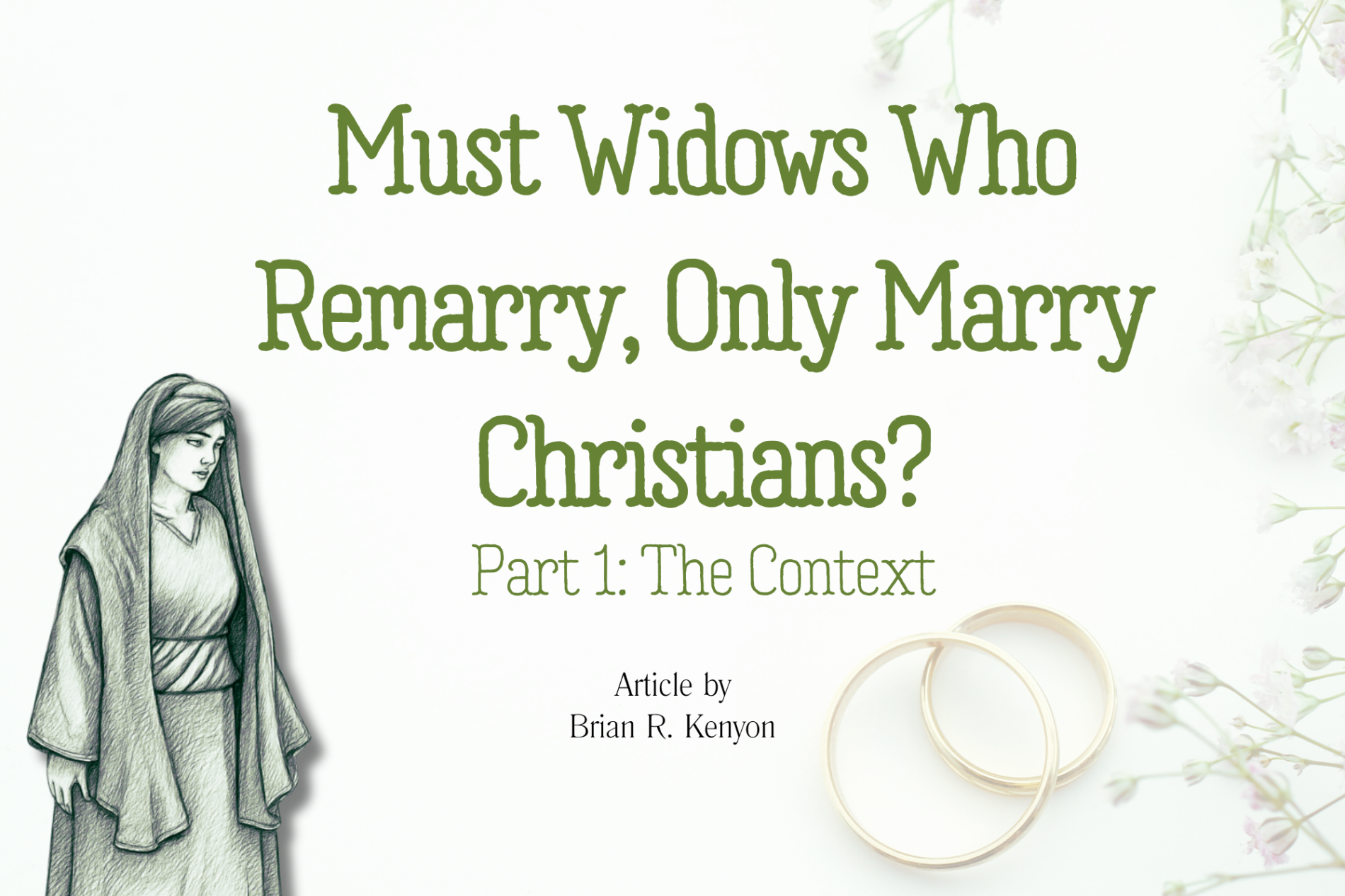By Brian R. Kenyon
First Corinthians 7 is a wonderful treatise on the expediencies of marriage. The chapter is more about when to marry than whom to marry. Next to the “not under bondage” issue (1 Cor. 7:15), the section on widows marrying “only in the Lord” is probably the other really controversial section in First Corinthians 7. As with any other passage in the Bible, popular opinions, strong emotions, and/or bias toward the views of influential preachers should not determine its meaning. Rather, we should allow the passage itself, along with its context and the total teaching of the Bible to determine its meaning.
The Verses In Their Context
As Paul closed this important chapter concerning marriage, he wrote concerning widows:
A wife is bound by law as long as her husband lives; but if her husband dies, she is at liberty to be married to whom she wishes, only in the Lord. 40But she is happier if she remains as she is, according to my judgment—and I think I also have the Spirit of God. (1 Cor. 7:39-40)
Paul reminded us that marriage is to be permanent (cf. 1 Cor. 7:10-11; Gen. 2:18-25; Mt. 19:3-9). A wife is “bound” to her husband as long as he lives! “Bound” is from the Greek word deo (δέω), which means to be tied. “Under bondage” (1 Cor. 7:15) is from a different word (douloo, δουλόω), and means to be enslaved. Marriage was never intended by God to be a slave relationship (cf. 1 Cor. 7:3-5). If a wife’s husband died, then she was free from that marriage and may remarry with God’s approval, if she so chose (cf. Rom. 7:2-3). However, Paul said “she is happier if she so abide” as a widow (unmarried). Again, the “present distress” had a bearing on why Paul recommended remaining unmarried throughout this chapter (1 Cor. 7:26, 28). Although this was Paul’s judgment (cf. 1 Cor. 7:25), he was an inspired apostle, and it must be taken as gospel truth!
Is “Only In The Lord” The Same As “Only A Christian”?
In English, “only in the Lord” can modify either the person whom she marries (adjectival phrase) or the action of marriage itself (adverbial phrase). Thus, there are basically two views on “only in the Lord” in this passage. First, those who affirm that it modifies “whom she will” (adjectival phrase) teach that the widow is free to remarry only a Christian. According to this view, “In the Lord” thus refers to a Christian, which it certainly does elsewhere (cf. Rom. 16:11; Eph. 6:21; see also the term “in Christ,” Rom. 6:3-4; Gal. 3:27). This is perhaps the more natural view on first reading and has much support in the commentaries through the centuries.
Second, those who affirm that it modifies “to be married” (adverbial phrase) teach that the widow is free to remarry only in harmony with the Lord’s will. Thus, “in the Lord” modifies the “action” of marriage rather than the “whom” of marriage. “In the Lord” is definitely used as an adverb elsewhere. For example, when Paul wrote, “Children, obey your parents in the Lord, for this is right” (Eph. 6:1 cf. Col. 3:18), was he teaching that only Christian parents (“in the Lord”) were to be obeyed? Of course, not! “In the Lord” is modifying “obey.” That is, children are to obey their parents, Christian or not, unless their parents are wanting them to do something against God’s will (cf. Acts 5:29). According to this adverbial phrase view, the widow, therefore, can remarry only one who is Scripturally eligible (i.e., one who has never been married, one whose spouse has died, or one who is innocent of fornication in a Scriptural divorce).
Fortunately, the original language of the New Testament sheds much light so we can know the truth. Like English, Greek adjectives modify nouns and pronouns (i.e., “whom she will”), whereas adverbs modify verb forms (i.e., “to be married”). In First Corinthians 7:39, the Greek adjective translated “only” (from monos, μόνος) is in the neuter form (monon, μόνον). In Greek, as in English, an adjective must agree in gender with the noun or pronoun that it modifies. A neuter adjective does not normally modify a masculine pronoun. “Whom,” in “whom she will,” is obviously masculine. According to Greek authorities, when a Greek adjective is used in the neuter gender without there being a neuter noun or pronoun as its antecedent, then it is being “used as an adverb … limiting the action or state to the one designated by the verb” (Bauer, et al., A Greek-English Lexicon of the New Testament and Other Early Christian Literature, 2nd rev. ed., 528). Thus, “only in the Lord” modifies the “act” of marriage, not the “whom” of marriage! While the phrase, “in the Lord,” can serve either as an adjective (modifying whom to marry) or as an adverb (modifying the act of marriage), the neuter word “only” in the phrase, “only in the Lord,” is used as an adverb (modifying the act of marriage) in the context of First Corinthians 7:39!
In Harmony With The Context And The Total Teaching Of The Bible
Not only does the Greek language indicate that “only in the Lord” is being used as an adverbial phrase (thus modifying “to be married,” rather than “whom she wishes”), this also harmonizes best with the universal application of God’s law on marriage. To be sure, all Christians (not just widows) should seek to marry Christians (cf. Mt. 5:13-16; 6:33; Col. 3:1-2). Those whom we marry have a great influence upon us, and may ultimately affect our eternal destiny (cf. 1 Kgs. 16:31; 21:25). However, it is possible that no Christian spouse is available, and Paul has already said that if a person cannot exercise the necessary self-control to avoid fornication, he or she must marry (1 Cor. 7:2, 9).
Furthermore, the “only a Christian” view must assume the widow in First Corinthians 7:39 is a Christian (or else a non-Christian widow would be forced to marry a Christian). However, the text nowhere demands that the widow be a Christian. The only place in First Corinthians 7 where Paul distinguished between believers and unbelievers was in verses 12-15. Would we say the husband in First Corinthians 7:3 is limited to only a Christian husband? Is the wife in First Corinthians 7:4 only a Christian wife? Are the “unmarried and widows” in First Corinthians 7:8 only Christians? Of course not, to all of these! These verses are true and applicable whether the men, women, husbands, or wives are Christians or non-Christians! God has only one law for marriage (Gen. 2:24; Mt. 19:5-6; Eph. 5:31! Given the universal nature of God’s law on marriage, why would some people dogmatically assume the widow in First Corinthians 7:39 is Christian?
To further show the inconsistency in this assumption, consider the verse again in view of the pronoun antecedents:
A wife is bound by law as long as her husband lives; but if her husband dies, she is at liberty to be married to whom she wishes, only in the Lord. (1 Cor. 7:39, emphasis added, BRK)
Does the “wife” refer to a Christian wife, to a non-Christian wife, or to any wife? Certainly, the answer is to any wife—how could any person with knowledge of the Bible think otherwise (cf. Gen. 2:24; Rom. 7:2-3)! What about the “her” that occurs twice? Does it refer to a Christian “her,” to a non-Christian “her,” or to any “her”? Certainly, because its antecedent is any “wife,” the “her” must refer to any “her.” What about the “she,” also occurring twice? Does it refer to a Christian “she,” to a non-Christian “she,” or to any “she”? Certainly, because its antecedent is “her,” whose antecedent is “wife,” the “she” must refer to any “she.” Why would one correctly acknowledge that the “wife” is not limited to a Christian wife, then teach the “she” or “her” is limited to a Christian wife whose husband has died when the pronouns all refer to the same female? To make the “she” only a Christian widow would be to make the “wife” only a Christian wife, which, of course, is totally out of harmony with God’s teaching on marriage throughout the Bible, which applies to all people, Christian or not (cf. Gen. 2:18-24; Mt. 19:3-12; Rom. 7:2-3; Eph. 5:25-33)!
Note also that the “widow can marry only a Christian” view actually makes this verse a “covenant passage.” That is, if such were true, it would only apply to Christians. Yet, the Bible, again, teaches that God’s law of marriage applies to all people, whether they are members of the Lord’s church (Gen. 2:24; Mt. 19:3-9). However, the view that “only in the Lord” modifies the action of marriage, thus allowing the widow to marry only a person who is eligible, can be universally applied to all widows, Christian or not! If Paul meant for widows to marry only Christians, why did he not make it clearer in other passages (cf. 1 Tim. 5:14)? Besides, at the very least, even if the “only a Christian” view were correct, why would it not be qualified by the “present distress” as are Paul’s other instructions on when to marry?
Conclusion
Marriage is a serious subject that affects more than just husbands and the wives. Marriage is intended to be a blessing from God (Pr. 18:22; Heb. 13:4), which provides authorized and needed companionship (Gen. 2:18-25), procreation (Gen. 1:26-28), and pure expressions of intimate love (Pr. 5:18-19; 1 Cor. 7:3-5). God created us and thus knows us best (cf. Jer. 1:5), way better than we know ourselves (cf. Pr. 14:12; Jer. 10:23). We must ascertain His truth on all subjects, especially marriage (cf. Jn. 8:32). We must only bind what God has already bound in heaven and loose only what God has already loosed in heaven (Mt. 18:18 cf. Gal. 1:6-9), which is revealed only through the Bible (cf. 2 Tim. 3:16-17). Unless both husband and wife die at the same time, one spouse will become widowed at some point. God knows the importance of marriage, whether a person’s first or second. May we all respect and apply His will (cf. Mt. 22:37-40). In Part 2 of this study, we consider possible objections to the view presented here.

 Alumni
Alumni Lectureship Audio
Lectureship Audio Lectureship Video
Lectureship Video
